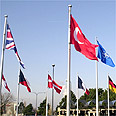
Flags of NATO member countries
צילום: איי פי
Is Israel headed for NATO?
There are increasing signs that NATO is interested in upgrading relations with Israel
Italian Defense Minister Antonio Martino recently announced that in his opinion, the time has come to include Israel in NATO as a regular member, and he intends to raise the issue at the meeting of NATO defense ministers next week.
Martino emphasized further that any future aggression against Israel would be considered an act of aggression against all the NATO states, and such recognition would undoubtedly contribute to the stability in the region.
The idea itself is not new. It has been considered for some time by diplomatic and security circles in Europe and the United States, mainly with regard to the status of “partnership” in NATO—in other words, without the collective defense guarantee that accompanies full membership.
Building cooperation
For the past two years, cooperation between Israel and NATO has become closer, to a certain degree – both on a multilateral level, within the Mediterranean Dialogue, and on a bilateral level, directly with NATO.
Last year, Israeli Ambassador Oded Eran submitted an official proposal for increasing cooperation, and since the visit of NATO Secretary General Jaap de Hoop Scheffer to Israel last June, NATO and Israel have been negotiating over completing the multilateral cooperation plan.
Within this framework, Israel has been asked to examine the possibility of “bearing the burden” similarly to the rest of the members and partners, and placing resources at the disposal of the alliance.
Israel consented, and announced its willingness to participate in Operation Active Endeavor, which is being conducted in the Mediterranean Sea as part of the alliance’s counter-terrorism effort. It also took part in three military exercises and hosted a conference of air force commanders from NATO and its partners.
Joint interests
NATO’s interest in including Israel stems from the heightened involvement of the alliance in the greater Middle East, and recognition of Israel's potential contribution, due to its experience and capabilities.
Back in December 2004, NATO representatives at the Herzliya Conference called upon Israel to strengthen its relations with the alliance. The announcement of the Italian defense minister, however, refers to a higher degree of inclusion, which also calls for an application of the alliance’s collective defense guarantee to Israel, as required by Article 5 of the North Atlantic Treaty.
Structural shift
Former Spanish Prime Minister Jose Maria Aznar also called for a structural and conceptual change in NATO that would lead to the inclusion of additional countries, including Israel, Australia and Japan. This is in light of the current strategic tasks—coping with Islamic terror and proliferation of non-conventional weapons.
These lines of thinking have recently been reinforced in Atlantic community circles, but the Israeli attitude towards upgrading ties with NATO is ambivalent: Along with willingness for further cooperation, there is ongoing skepticism as to the benefits of institutionalizing the relationship in a member status.
This is based on the fear that a multilateral defense pact will limit Israel’s freedom of action. In addition, some officials in Israel believe that Israel’s deep relationship with the US is sufficient, and there is no added value in ties with the European states as well, some of whom employ unbalanced policies towards Israel.
Favorable winds
It would appear that recently, more favorable winds have been blowing in Europe. Moreover, the strategic understandings between the U.S. and Israel, which were formulated between then-Prime Minister Netanyahu and President Clinton and subsequently ratified by their successors, including President Bush’s letter of commitments from April 2004, successfully anchor Israel’s right to defend itself on its own.
Therefore, the collective defense of NATO will serve as another tier in regional stability. This is the goal of the Italian defense minister.
At last year’s Herzliya Conference, the writer of these lines presented the “British model,” with all of its aspects, as the most suitable for Israel as a member of NATO. Jerusalem should follow with interest the upcoming meeting of the NATO defense ministers, in which, as mentioned above, the idea of Israel’s membership may be discussed.
Prof. Uzi Arad is the Founding Head of the Institute for Policy and Strategy at the Lauder School of Government, Diplomacy and Strategy of the Interdisciplinary Center Herzliya










